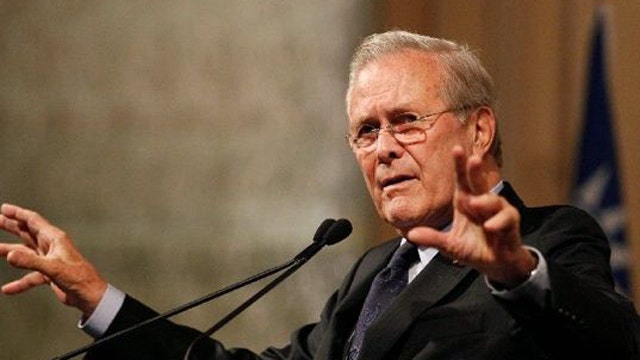Rumsfeld: Times of London article inaccurate
Former secretary of defense fires back at article that claimed he said George W. Bush was wrong on Iraq
Donald Rumsfeld, one of the leading architects of the Iraq war, reportedly said in a recent interview that then-President George W. Bush was "unrealistic" to pursue democracy in the country.
Rumsfeld, who served as Bush's defense secretary from 2001 to 2006, allegedly made the comments in an interview with the Times of London.
"I'm not one who thinks that our particular template of democracy is appropriate for other countries at every moment of their histories," Rumsfeld is quoted as saying.
"The idea that we could fashion a democracy in Iraq seemed to me unrealistic. I was concerned about it when I first heard those words."
However, Rumsfeld later pushed back against the Times article, telling Fox News' Greta Van Susteren that the article was inaccurate.
"It's nonsense. The article was not accurate," Rumsfeld said. "We have a transcript of the interview I had with the London Times and it's unfortunate that people do that but that's life."
"Actually what I said was that our goal when we went in was to have Saddam Hussein gone, to have a leadership in the country that would not invade its neighbors, would not have weapons of mass destruction and would be reasonably respectful of the various diverse ethnic groups – the Kurds, the Shias and the Sunnis," Rumsfeld told Greta.
"We were not there to be occupiers and I’m for democracy but my concern about the word was that it would leave the impression in that country – inaccurately – that the United States intended to impose it’s form of democracy on their country."
"We had slaves into the 1800s, women couldn’t vote in the 1900s so our form of democracy has evolved and will be different in another 50 years. The idea that our template would fit them at their stage of evolving governance, I thought, would be an unfortunate impression on their part." Rumsfeld said.
The comments to the Times, if accurate, would mark a departure from Rumsfeld's robust public defense of the war during the Bush administration, and signal a rare break between him and the former president on foreign policy.
Since the 2003 invasion and the toppling of dictator Saddam Hussein, Iraq has held multiple elections. But most recently, majority Shiites have been accused of sidelining minority Sunnis, feeding tensions that were exploited by the Islamic State, a Sunni terror group.
Even as he allegedly voiced second thoughts about the U.S. goals in the Iraq war, Rumsfeld scolded western governments for their current failure to deal with Muslim extremists.
"The movement for a caliphate, the movement against nation states is central and fundamental. And no one's talking about it," he said.
In Iraq and Syria, foreign fighters have flocked to the region to join the Islamic State's self-declared caliphate. Rumsfeld told the Times that western leaders are refusing to even admit the nature of the threat.
"If leaders aren't willing to do it, why the hell should a guy with a wife and kids in the community put himself at risk?" he asked, describing the fight ahead as "more like the Cold War" -- won with ideas, not "bullets."
Rumsfeld also accused President Obama of abandoning "America's historic role in promoting and defending free societies."

























